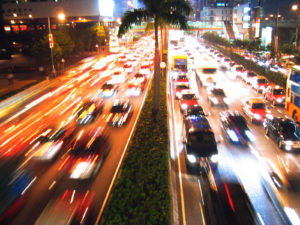 Can you feel the change? The world is speeding up, not just because we’re getting older, but because of the pace of technological and social development in a globalized world. To thrive with this change, we can’t expect to do things as we’ve done them before.
Can you feel the change? The world is speeding up, not just because we’re getting older, but because of the pace of technological and social development in a globalized world. To thrive with this change, we can’t expect to do things as we’ve done them before.
So what can we do differently in order to avoid overwhelm and thrive in a speed-ed up world? First of all, we need to see the world differently.
Imagine how it felt a few hundred years ago when most people believed the world was flat. It would have been so obviously true that the world is flat. Everyone can see it and feel it with their own bodies. Anyone who spoke otherwise would have been derided as delusional. And yet it was not true. How did people change their thinking?
There must have been a tipping point that began with only a few esoteric scientists whose ideas were rejected even by other scientists. The institutions whose power would be threatened by those changes –notably the church, strongly rejected the new ideas. Gradually, or maybe suddenly, people realized a whole new way of looking at the world that created all kinds of clarity and new opportunities for living on this planet. With a huge expansion of new questions (Where is India? How do I stick to the ground?) a new age of exploration was born.
Almost a century ago, a new set of brilliant scientists began developing another more accurate way of seeing the world through quantum mechanics. Their discoveries are mindbogglingly bizarre. While they have resulted in new technologies that we take for granted (lasers and transistors to name two), they challenge our most basic beliefs about reality. The pioneering scientists who are testing quantum affects in wider contexts such as health, human influence, relationships and spirituality are implying possibilities that challenge the principles behind our most powerful institutions.
As the world speeds up and we become more desperate for breakthrough solutions. How long can we keep ignoring reality? When will we begin seeing the world through quantum eyes?
Here are some of quantum ways of seeing the world that I am talking about.
- We are all connected by a field of energy.
- Our thoughts have impacts at a distance.
- Our thinking creates our reality.
- Human minds have potential far beyond what we have imagined.
I don’t necessarily intend to convince you of these points. Perhaps these are already obvious and known to you. If you’re curious to know more, I recommend some excellent books on the subject at the end of this article.
What I am saying is that a new age of exploration is being born just at a time when we really need it. That’s because there’s another aspect of reality that we have a tendency to ignore –the fact that we are rapidly outgrowing all of our global systems: economic, political, social and environmental.
The quantum view opens the possibility of breakthrough technologies that can help us solve these highly complex and rapidly evolving problems. These are not electrical nor information technologies, but human technologies. Here are a few breakthrough solutions that we need.
Mindfulness Training
Workplace stress is at new highs due to the combination of always-on technology, working across time zones and increasing global competition requiring us to continually make more money with less time and fewer resources. The stress on our health is increasing due to inactive lifestyles and contamination of the environment. We need breakthrough technologies for handling this stress. Mindfulness training revamps ancient meditation technique for the modern age. It is quickly gaining acceptance as a most efficient and effective way to find equanimity and clarity.
Compassion
Our global problems require global cooperation like never before, especially as resources such as oil and water may become scarce and climate change threatens our physical and food security. New levels of specialization and mutual support are necessary and can only be maintained through consistently higher levels of compassion. Through greater compassion we can create much greater health and happiness for all beings. And compassion can be trained. Compassion is sustainable way to find well-being and happiness even in very challenging situations.
Intuition
As speed and complexity increases, it is extremely difficult for large organizations to make decisions quickly and accurately enough to keep up with the pace of the world. Decisions made by one person at the top can be fast, but good decisions require consideration of many perspectives. Intuition is a way to tap into much wider sources of information at rapid speed. Although intuition is still currently mostly ignored as a decision-making tool in business, more research and practical proof will show how it has always been a factor in good decision-making and how we can train our minds to use it much more frequently and fruitfully.
These three breakthrough solutions: mindfulness training, compassion and intuition work together. And sometimes they create synchronicity, as if we are more aligned with the will of the universe; everything is easier.
In the quantum age, we can set aside conventional logic that says the world is made up of separate entities that are in competition with each other for limited space and resources. We can embrace the illogical but true facts of quantum mechanics and keep our minds open to the possibilities of their impact. Leaders in the quantum age can aspire to the ease of creating through synchronicity. And we can do that much more quickly and easily than seems logically possible by taking daily steps to build our mindfulness, compassion and intuition.
Bibliography
The Intention Experiment by Lynne McTaggart
The Bond by Lynne McTaggart
Do You Quantum Think by Dianne Collins
Frequency by Penney Peirce
The Translucent Revolution by Arjuna Ardagh
Mind Over Medicine: Scientific Proof that You Can Heal Yourself by Lissa Rankin MD
The End of Progress: How Modern Economics Has Failed Us by Graeme Maxton
Consumptionomics by Chandran Nair
The Upside of Down: Catastrophe, Creativity and the Renewal of Civilization by Thomas Homer-Dixon
Sacred Economics: Money, Gift and Society in the Age of Transition by Charles Eisenstein

